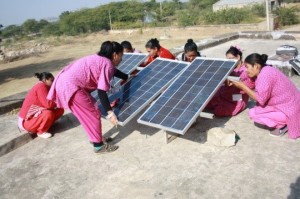Source: latinamerica.undp.org
Published: March 10, 2016

At the University of Barefoot in India, Honduran women practice building solar panels. Photo: UNDP Honduras
La Mosquitia, Los Naranjos and Los Hornos, and El Zapote and Buenos Aires, located in the north east, south and east respectively, are areas that are difficult to access. People earn a living through agriculture and paid work is only available during harvesting season on the large plantations located far from their homes.
These communities live in houses made of adobe or wood with dirt floors, experiencing serious difficulties in the absence of electrical energy.
“Although we are accustomed to this, without any light our children cannot study at home – even during the day. One of them suffers from respiratory problems, our house and clothes are stained with soot and the smell of smoke,” says 69-year-old Juanita Zambrano, who lived in Los Hornos the past 51 years.
In 2014, Iris Marlene Espinal and Carmen Lourdes Zambrano Cruz (from Los Hornos and Los Naranjos) and Alnora Casy Estrada and Ingrid Miranda Martinez (La Mosquitia) prepared themselves for six months as technical support staff for solar energy at The Barefoot College in Tilonia, India. Their trip was in collaboration with the Government of India and the Small Grants Program (SGP), a program supported by the Global Environment Fund (GEF) and UNDP.
The “Solar Engineers” initiative was launched in 2008 through a SGP/FMAM lamps partnership and the Barefoot College. The college provided technical and financial support, and is a pioneer in the field of teaching complex technological processes to illiterate students. None of the four women from Honduras knew how to read or write but were able to learn skills to help their communities.
“We didn’t have any diplomas like students at a normal university; in India, we learnt using a practical approach in order to make lamps, assemble electronic circuits and manage and install the solar panels. We brought back a lot of knowledge to benefit our communities and, in a sense, to help them to escape from poverty,” said Alnora Casy.
After learning how to install, maintain and repair solar energy equipment, the women returned to their communities to provide energy to their districts. In exchange for their services, the female engineers received a monthly salary from the city’s solar energy committee.
In Honduras, the four women installed panels together with other members of their communities, whom they trained. Each of the 207 installed panels generates 85 watts per household.
This article no longer exists at the Source link above. It can be found in the Matteroftrust.org Resource Library.
